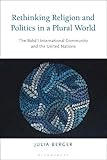Rethinking religion and politics in a plural world : the Baha'i International Community and the United Nations / Julia Berger.
Material type: TextPublication details: London : Bloomsbury Publishing Plc, 2021.Description: 1 online resource (225 p.)Content type:
TextPublication details: London : Bloomsbury Publishing Plc, 2021.Description: 1 online resource (225 p.)Content type: - 1350130338
- 9781350130333
- Bahai Faith and politics
- Bahai Faith and social problems
- Organizational behavior -- Religious aspects
- Non-governmental organizations
- Foi bahaïe et problèmes sociaux
- Organisations non gouvernementales
- Religion & politics
- Non-governmental organizations (NGOs)
- Globalization
- Baha'i
- Religion -- Baha'i
- Religion -- Religion, Politics & State
- Social Science -- Sociology of Religion
- Political Science -- NGOs (Non-Governmental Organizations)
- Bahai Faith and politics
- Bahai Faith and social problems
- Non-governmental organizations
- Organizational behavior -- Religious aspects
- 297.932 23
- BP370 .B47 2021eb
- online - EBSCO
| Item type | Current library | Call number | URL | Status | Notes | Barcode | |
|---|---|---|---|---|---|---|---|
 eBook
eBook
|
Biblioteca "Angelicum" Pont. Univ. S.Tommaso d'Aquino Nuvola online | online - EBSCO (Browse shelf(Opens below)) | Online access | Not for loan (Accesso limitato) | Accesso per gli utenti autorizzati / Access for authorized users | (ebsco)2726419 |
Browsing Biblioteca "Angelicum" Pont. Univ. S.Tommaso d'Aquino shelves, Shelving location: Nuvola online Close shelf browser (Hides shelf browser)
Description based upon print version of record.
Cover -- Contents -- List of Figures -- Preface -- Acknowledgments -- Abbreviations -- 1 Ideas, Religion, and Social Change -- 2 Forging a Global Polity: The Bahá'í Community on the World Stage -- 3 Shaping Organizational Behavior: An Evolving and Generative Framework -- 4 A Distinct View of History, Time, and the Emerging Global Order: The United Nations through a New Lens (1945-1970) -- 5 Responding to Persecution and Mobilizing for Gender Equality: An Emerging Global Architecture of Diplomacy and Social Change (1970-1986)
6 Beyond Peace: The Greater Trajectory for Social Development (1986-2008) -- 7 Beyond Pluralism: A New Framework for Constructive Engagement (2008-2020) -- 8 Rethinking Religion and Social Transformation in the Modern World -- Notes -- Bibliography -- Index
"In this book, Julia Berger examines internal meaning-making structures and processes driving NGO behavior, identifying constructs from within a religious tradition that forge new ways of pursuing social change. She evaluates the operation of a distinct rationality, arguing that action is guided not simply by beliefs and values, but also by a combination of elements so intrinsic as to constitute an "organizational DNA." These hidden structures and rationalities manifest themselves in new modes of engagement and agency; they help us to see the pivotal role of religion in shaping notions of peace, progress, and modernity. To demonstrate the operation and salience of such a rationality, Berger draws on the example of the worldwide Baha'i community. Emerging in 19th century Iran, the community's theological engagement with questions of justice, the unity of humankind, and the emerging global order, constitute one of the most distinct and compelling, yet least-researched examples of religious engagement with the pressing questions of our time. Analyzing events spanning a 75-year period from 1945-2020, this book provides a unique historical and contemporary perspective on the evolving role of religion and civil society in the modern world."-- Provided by publisher.









